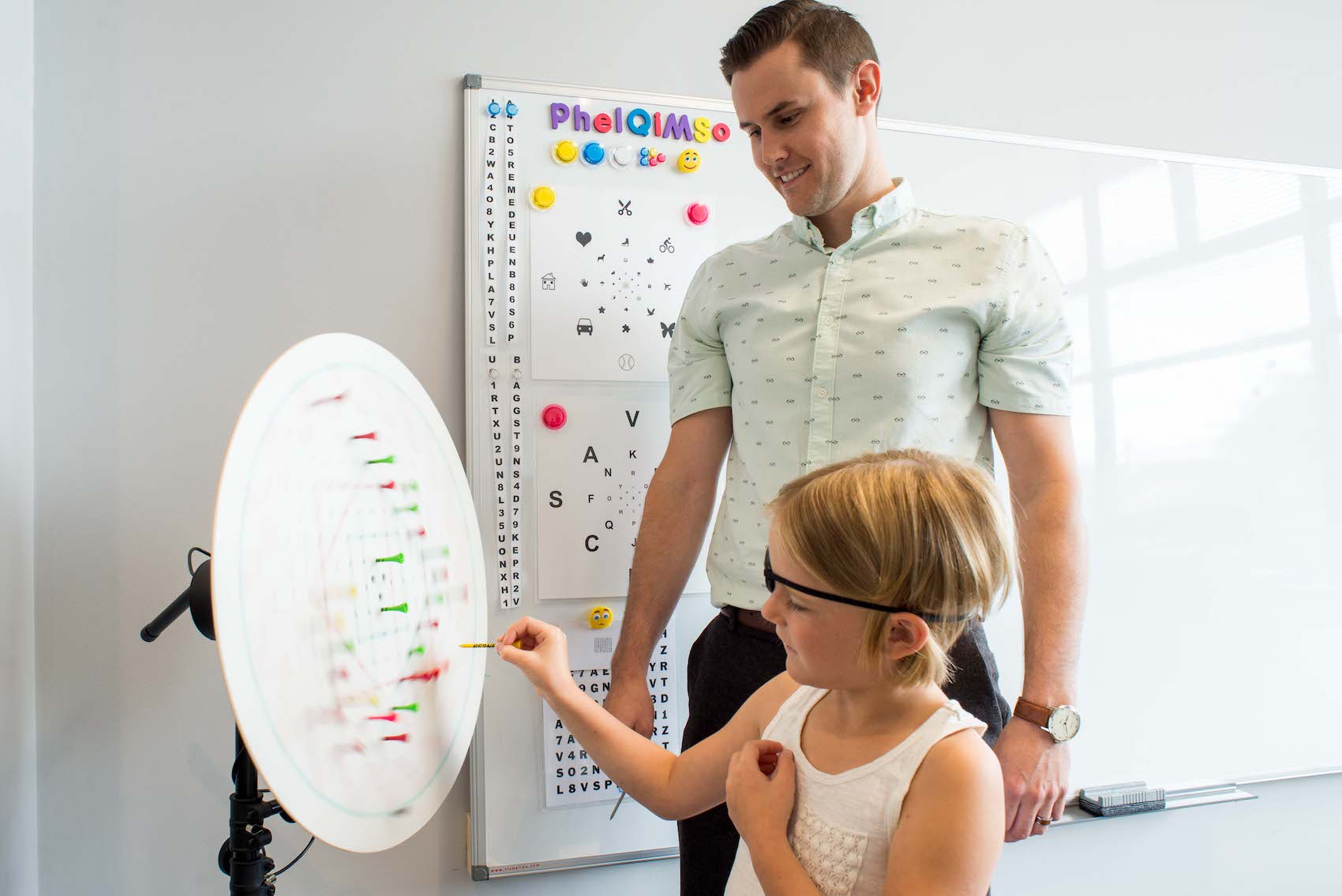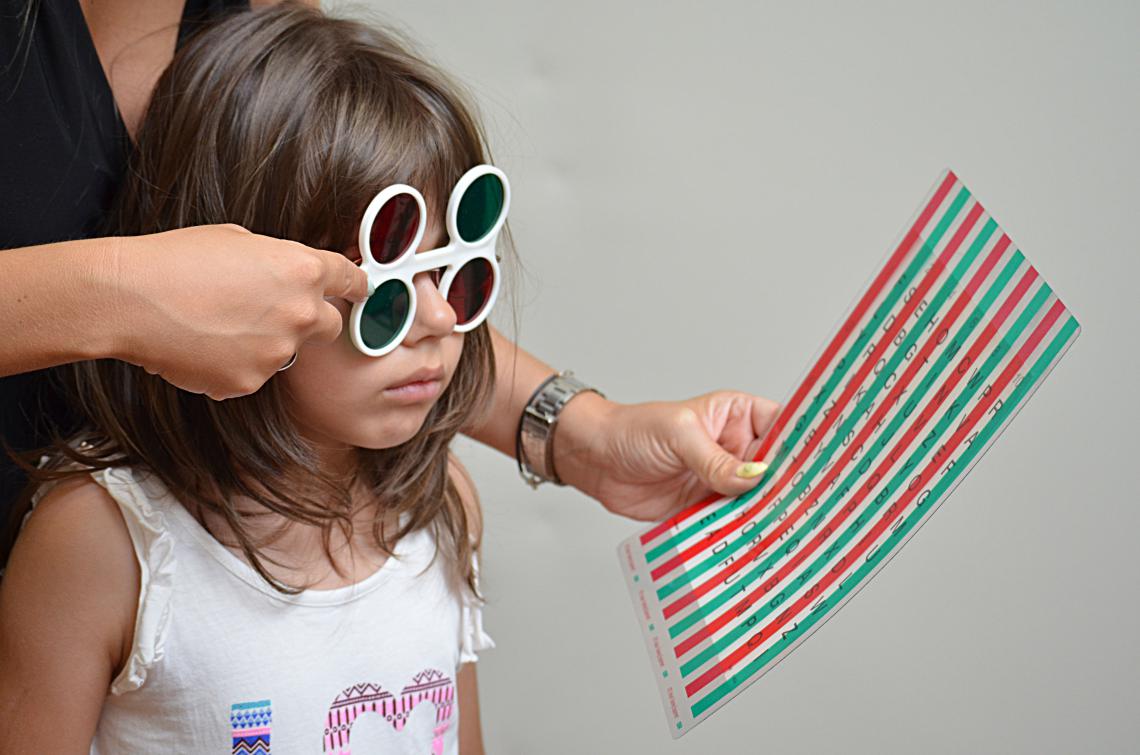Vision therapy is has been shown over decades to successfully play a role in the management of several conditions, including;
- Lazy eye
- Eye turns (strabismus)
- Convergence Insufficiency
- Dyslexia
- ADHD
- Learning difficulties
Who benefits from vision therapy?
Many people can benefit from vision therapy. Some of the most common groups of people who may benefit from vision therapy include:
- Children with visual problems such as amblyopia (lazy eye), strabismus (crossed eyes), and visual perception disorders like dyslexia.
- Adults with visual problems such as binocular vision disorders (double vision, convergence insufficiency), acquired brain injuries, and visual problems caused by trauma.
- Athletes of all ages who want to improve their visual skills, such as hand-eye coordination, reaction time, and visual tracking, in order to enhance their sports performance.
- People who have suffered from a stroke or have been diagnosed with neurological conditions such as multiple sclerosis, traumatic brain injury, or cerebral palsy.
- Individuals who experience visual symptoms such as headaches or eye strain caused by visual problems, or those who have been diagnosed with a specific visual disorder such as myopia, hyperopia, or astigmatism.
- People who have had cataracts or other eye surgery and need to rehabilitate their vision.
- Individuals who have reading difficulties, difficulty with eye-hand coordination, or those who are experiencing difficulties in school or at work due to visual problems.

It’s worth noting that vision therapy is not a one-size-fits-all solution and not everyone will benefit from it. An eye examination and consultation with a vision therapist are necessary to determine if vision therapy is appropriate and beneficial.
Also Read: What is Vision Therapy? How is it helpful in treating Vision Problems?
What are the principles of vision therapy?
Vision therapy works by targeting specific areas of the visual system, including the eyes, the brain, and the nerves that connect them. The therapy includes a variety of exercises and activities that focus on improving visual skills such as eye coordination, focusing, and tracking.
What is vision therapy?
Vision therapy is a program that aims to improve a person’s visual abilities. It uses a variety of ways – such as eye exercises, testing, occlusion (patching) lenses and prisms – to treat a range of visual problems.
Vision therapy may be used to treat problems such as:
- amblyopia (lazy eye)
- eye alignment and coordination problems (including turned eyes or squints)
Each program is designed to suit the specific needs of the individual.
![]()
How vision works
Vision is the process of deriving meaning from what is seen. It is more than simply the ability to distinguish fine details (visual acuity). Vision also involves:
- accommodation (focusing)
- convergence (eye aiming)
- binocularity (eye coordination)
- fixation and eye movement abilities
- eye-hand coordination
- visual form perception.
Vision continues to develop after birth and is influenced by the visual environment and someone's experience.
Vision problems can exist even if you have healthy eyes and can see clearly. Difficulties may occur in your eye muscle control and coordination.
If you have vision problems, you may experience visual discomfort when performing visually demanding activities.

How does vision therapy treat eye problems?
According to the Australian Bureau of Statistics
, approximately half the Australian population has some vision problem that requires treatment.
While most people have refractive errors (such as short-sightedness, long-sightedness, astigmatism and presbyopia), in some, their eye problems can be improved by vision therapy.
Although vision therapy is available to people of all ages, it is more effective in children and young adults.
Vision therapy for children and young people
One common problem in children is they may have difficulty coordinating their eyes. To see something clearly, both eyes must be aimed correctly and focused at the right distance.
Any problems with aiming or focusing the eyes can cause a variety of symptoms, including:
- intermittent double vision
- blurred vision
- headaches
- eyestrain.
Children with these problems often do not complain about them, but may simply avoid tasks (such as reading), which are difficult or cause discomfort.
An optometrist may suggest a program of vision therapy to improve eye coordination and focusing.
What does a vision therapy program involve?
A vision therapy program (also known as visual training) is designed by an optometrist to meet individual needs. So, your program may differ from someone else’s.
Vision therapy is typically used to improve the coordination and control of eye movements and a program may include:
- diagnostic tests
- training procedures
- exercises
- use of lenses and prisms – these may be integral to the successful treatment of your vision problem.
The frequency of optometrist visits, amount of home training and duration of the therapy will depend on the nature and severity of your eye problem.
Sometimes you will work with the optometrist in their office and then other times, you may have work to do at home (such as activities and exercises).
Regular practice is important to achieve the best results. Therapy will teach you how to have better eye control to improve your understanding of what you are seeing and reading. You may find that therapy gives you greater confidence and improves your performance in daily activities – such as at school, university, or work.

Reference:
- optometrists.org/vision-therapy/vision-therapy-for-children/what-is-the-youngest-age-to-start-vision-therapy
- betterhealth.vic.gov.au/health/conditionsandtreatments/vision-therapy
- bynocs.com/top-10-ways-vision-therapy-can-benefit-your-visual-health
See Also:
- What Are Visual Skills?
- What is a Behavioral Optometrist?
- Vision Therapists at 4D Vision Gym
 وبلاگ تخصصی عینک شامل مجموعه مطالب پزشکی است که اطلاعات مفیدی در رابطه با عینک , چشم، لنز، سلامتی چشم و راه های پیشگیری از بیماریهای چشمی، کنترل و درمان آن را در اختیار شما کاربر محترم می گزارد.
وبلاگ تخصصی عینک شامل مجموعه مطالب پزشکی است که اطلاعات مفیدی در رابطه با عینک , چشم، لنز، سلامتی چشم و راه های پیشگیری از بیماریهای چشمی، کنترل و درمان آن را در اختیار شما کاربر محترم می گزارد.